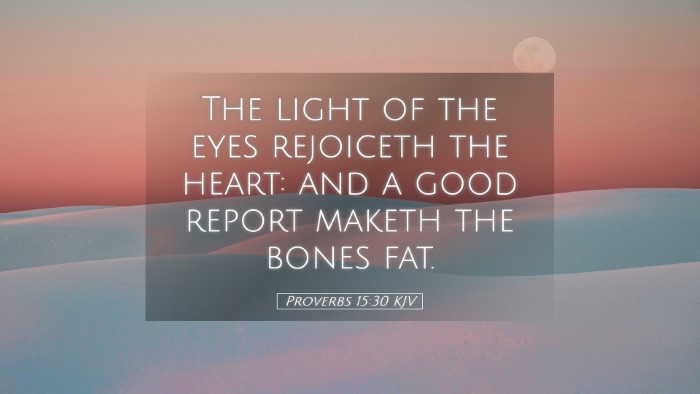Commentary on Proverbs 15:30
Verse Citation: Proverbs 15:30 - "The light of the eyes rejoices the heart: and a good report maketh the bones fat."
Overview
This verse, nestled within the rich tapestry of wisdom literature, emphasizes the profound impact of perception and communication on the human spirit and physical well-being. The "light of the eyes" serves as a metaphor for joy and hope, connecting one's inner state with a sense of gladness and vitality.
Insights from Public Domain Commentaries
Matthew Henry
Henry notes that the "light of the eyes" refers to a joyful countenance, which reflects how the heart feels. He states that a person's outward expression can communicate inner joy, making it crucial not only for oneself but also for those around. This reflects an essential spiritual truth that joy is contagious and can uplift others. Additionally, he emphasizes the significance of a "good report," interpreting it as favorable news that can invigorate and strengthen individuals, akin to physical nourishment that impacts their overall health.
Albert Barnes
Barnes expands on the "light of the eyes," suggesting it points to the happiness and cheerfulness that comes from a positive spirit. He highlights the importance of one's outlook on life, explaining that the way one perceives the world can bring joy or sorrow, to themselves and to others. In his commentary, the phrase "maketh the bones fat" is noted as an idiomatic expression signifying an invigorating or prosperous condition of health and life. Barnes insists that good, uplifting news and the joy it brings can lead to a profound and lasting impact on both mental and physical health.
Adam Clarke
Clarke interprets this verse through the lens of both physical and spiritual lights. He elucidates that the "light of the eyes" symbolizes not just joy, but also the divine enlightenment and wisdom gained through a relationship with God. He proposes that the heart, often symbolic of one's emotions and thoughts, responds to this light with gratitude and a grateful spirit, fostering good health. Furthermore, he explains that good news or a positive report can significantly empower a person, contributing to their emotional resilience and vitality in a challenging world.
Theological Implications
This verse provides fertile ground for theological reflection on the connections between our spiritual state, mental outlook, and physical health. It underscores the importance of a vibrant inner life cultivated through one’s relationship with God and the consequential joy that radiates outward to others.
- Joy as a Spiritual Gift: Recognizing joy as a divine gift underscores its significance in a believer’s life.
- The Role of Community: The well-being of individuals is often tied to the community; reports of goodness nourish the soul.
- Health and Spirituality: The holistic view that understands a person as body, mind, and spirit aligns with the teachings found in Scripture.
Practical Applications
For pastors, students, theologians, and Bible scholars, the implications of Proverbs 15:30 translate into actionable insights in various ministries and studies:
- Encouragement in Ministry: Understanding how uplifting words and actions can impact the community.
- Focus on Joyful Expression: Encourage congregations to express their joy in Christ, influencing others positively.
- Contemplating Good News: Create spaces to share encouraging testimonies and good reports within the church.
- Integration of Wellness: Promote spiritual and emotional wellness alongside physical health in various ministries.
Conclusion
Proverbs 15:30 invites profound reflections on the interconnectedness of emotional joy, uplifting communication, and their effects on our health and well-being. It encourages a life characterized by joy, marked by the light of Christ, offering considerable hope and vitality not only to ourselves but also to the communities around us. Engaging with this wisdom is essential for meaningful pastoral work and theological discourse as we strive to reflect God’s light in a world often overshadowed by despair.


